History
A company’s culture isn’t easily described. It’s the intricate sum of every part of the company, no matter how insignificant it might seem: from the founders, employees, clients, workplace and events, all the way down to the coffee. Which brings us to Bakken & Bæck. For those who haven’t heard of the digital innovation agency, here’s a quick impression. They create products like Wake, an app for sharing and discussing design work with your team. Designed for internal use by B&B, the app became so successful that it’s now a company in its own right. They have offices in Amsterdam, Bonn and Oslo. They keep bees on the rooftop of their Oslo office and give away the honey to friends and family — almost 1000 jars already this year. They made the world’s biggest Rubber Chicken Slingshot. They designed Norway’s first supermarket in the app store. They sent their design team to Tokyo for inspiration and their developers to Austria, France, Sweden, Switzerland and the US. For their yearly summer party, an employee from Romania invited everyone to Bucharest to meet her family. They launched the first drone-based piñata delivery service (somehow Amazon and Google hadn’t thought of it before) in Oslo and Austin, Texas during SXSW. They have held three annual conferences called An Interesting Day on a tiny island in the Oslofjord, Norway, with speakers including Andy Moon, Jessica Walsh, David Karp and Frank Chimero. Coming summer, they’ll move the conference to Amsterdam, the hometown of their third office.
This interview is a search for how this peculiar company came to be, how their culture fosters energy and how they grow and change, yet stay true to their values.
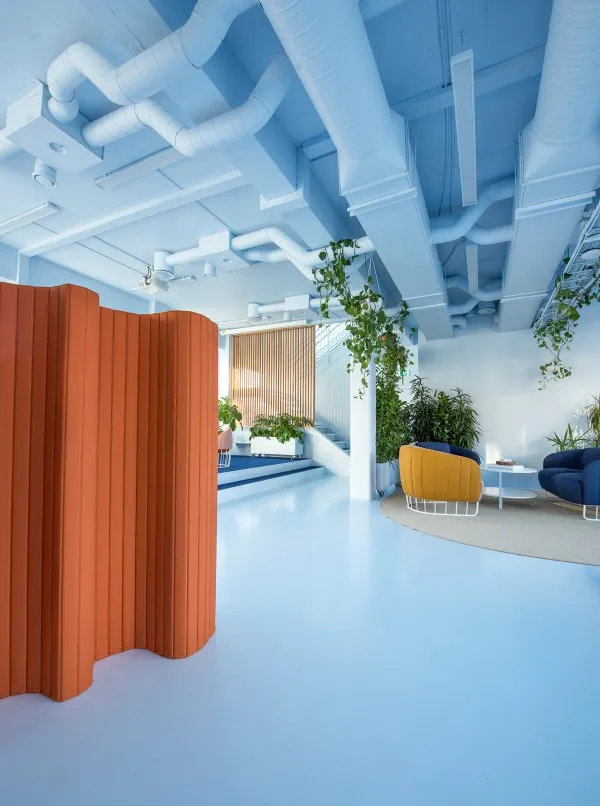
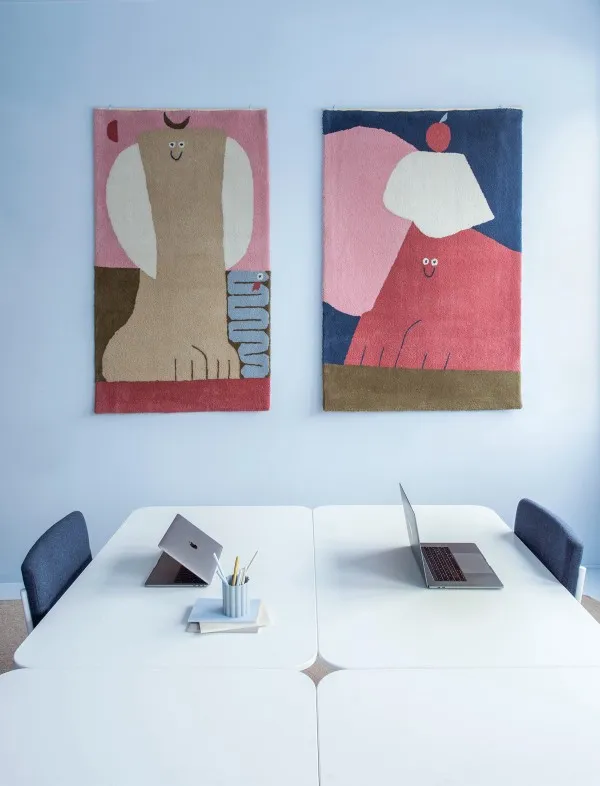
Tobias
I meet Tobias, one of the two B&B founders, in their Oslo office. The entire office space is a soft blue. It’s not cold or clinical, but warm and calm, much like the enthusiastic ‘hellos’ I receive from a few employees I’ve met before. When I see Tobias, he hangs up his call, swiftly walks towards me and welcomes me with a firm handshake and a quick smile as we sit down in a meeting room.
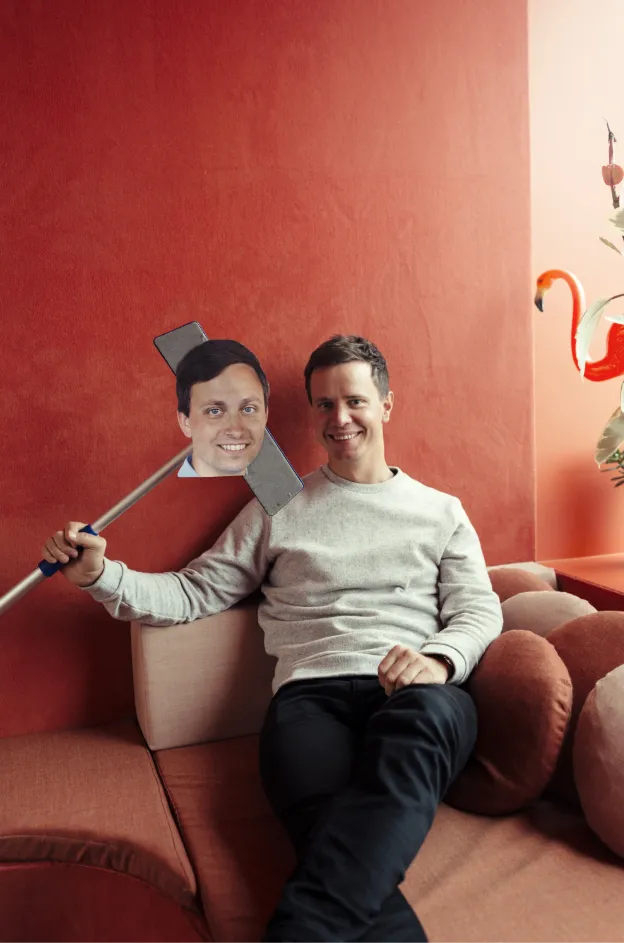
We begin by talking about his studies. He praises the renowned Kaospilots program, where he learned to share and receive brutally honest feedback. How innovation, project management and leadership skills were developed there through real life projects with real life clients. “For me personally, that has been really important”, Tobias says. After a disappointing move to San Francisco, where he worked in siloed cubicles at what he thought would be a dream job at Flickr (Yahoo), Tobias returned to Oslo to work for an NGO where he could work again with passionate people on passionate projects, just like at the Kaospilots program. That job was where, in addition to meeting his wife and mother of his two kids, he was finally able to work with Johan, Bakken & Bæck's other co-founder. “I had been trying to get Johan on board for ten years, but he never had time. At the NGO I hired Johan to work with me on what turned out to be a super successful project. Even better, we got to know each other very well
Both realised they wanted to work together more often. After a failed attempt to launch a startup, the pair decided they were better off building (digital) products for other companies. The timing was peculiar, to say the least. They started the business a week after Tobias became a father. “We realised that we didn’t have time to waste and knew we had to go all in if we wanted to succeed. We decided to do small, high quality projects, but nothing too ambitious. It’s why we came up with our name: Bakken & Bæck. Just the two of us.
“We don’t want to be afraid to spend money. If I worked at a company where I had to apply for a grant explaining why I think something is a good idea, it would never happen.” — Tobias
Serendipity
One of the cornerstones of Bakken & Bæck is serendipity. They passionately believe that being generous gives back more than you could ever budget for. It’s a refreshingly human approach in which intuition and passion trump security and logic. Tobias and Johan realized this in their first year, when they spent almost all their money on two tickets to a conference in France and hosting an evening for all the other Norwegian attendees. The gamble paid off as the event led to three of the larger projects they worked on the following year.
In their second year, after welcoming their first intern and hiring two designers, they hosted a 1 year anniversary party; a Mexican fiesta in an old stable in Oslo. Once again they spent almost all their money on an event, with a large chunk of the budget this time paying for a Mariachi band to fly over from Germany. For most companies this behaviour would be unheard of, but it makes perfect sense for Bakken & Bæck. “The most important thing for us was to make the party conceptual: an experience that nobody would be able to get or ‘buy’ somewhere else.” The corners of Tobias’ mouth turn into a grin, the kind you see on a kid’s face. “I still think it was the best party I’ve ever been to.”
Spending all that money wasn’t part of a long term strategy, it was simply an investment in serendipity. “The five of us just thought it was fun. Either it would work really well and we’d make a ton of new relationships and build on the ones we had — or we would go out with a big bang.”
“We don’t want to be afraid to spend money,” Tobias continues. “If I worked at a company where I had to apply for a grant explaining why I think something is a good idea, it would never happen. That’s why we just do something. It works for us — perhaps not always how we anticipate — but it’s super effective and certainly valuable. In our experience when you create something truly memorable, it’s worth the extra cost. Whatever it is then becomes an investment, rather than an expense.”

Experience design of the work life
When B&B expanded beyond a two-man show, the company’s direction and purpose changed. “When it was just Johan and me, it was about freedom and being able to make cool stuff. When we grew to five people, we suddenly became a group. The company was much more about them — the team became more important than our clients and even ourselves”.
“We really want to be there for the people who work here and make them proud of where they work. One way of doing that is by ensuring that our people have multiple things to talk about when they discuss their work with friends, neighbors, parents or someone they meet in a bar. It’s experience design of the working life.” The seemingly random puzzle pieces of rooftop bees, rubber chicken slingshots and trips to Tokyo suddenly fall into place.
Gunvor, B&B’s Head of People for the last three years, is living proof of how this ‘experience design of the work life’ not only attracts clients, but is an investment in recruiting talent too. “I knew a lot about B&B before I wanted to work there. I went to their events and parties and fell totally in love with them. I just knew they were good people.”
“Our growth will be about becoming a better company, not a bigger one.” — Tobias
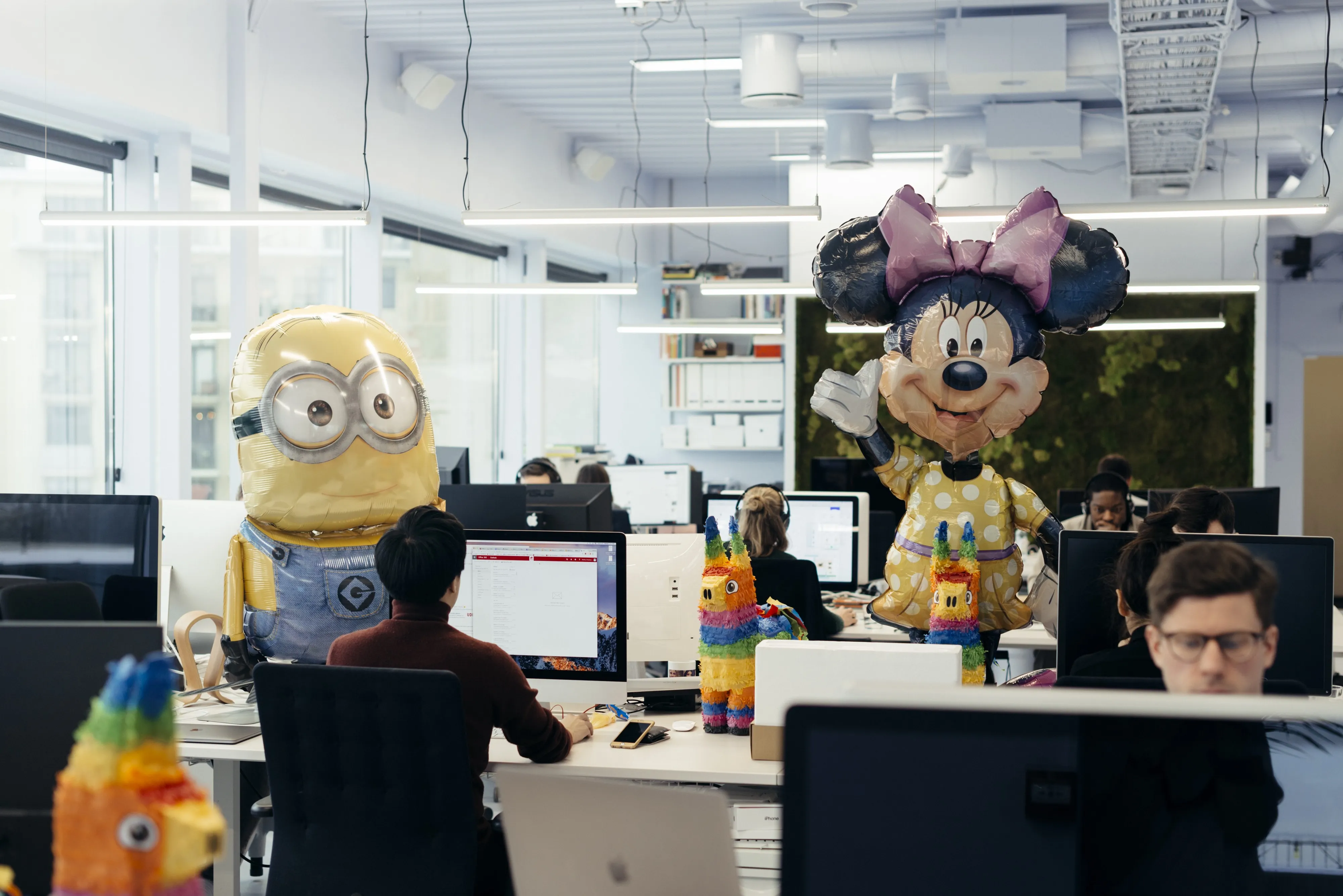

No silver bullet
Attracting clients and talent is one thing. But making sure the people you hire are happy, and stay happy is a completely different ballgame. Astoundingly, only three people have left B&B in the past six years. What’s the secret of their success?
There is none, of course. It comes back to genuinely caring. Listening. Building trust by allowing everyone to make mistakes and learn from them. Tobias: “Whenever we hire, it feels like including someone in the family. If it didn’t pan out the way we had hoped for, we will try everything to make it work. “If someone doesn’t work well under certain conditions, we facilitate different ways of working to help them reach their full potential. This way our employees can take part in shaping their own jobs. In return we get a unique team with individually tailored skill-sets.”
When I ask Tobias what he might have done differently if B&B could start all over again, his answer is that he would spend more time on recruiting and cultivating a mix of young talent with experienced people from the start. Tobias reasons: “Most of the people here have grown into their position. That’s good and bad: good because you get people who are perfectly shaped into what we need; bad because it takes a lot of time. There have been times when we’ve tried too long to make it work. Sometimes it just doesn’t fit. But I definitely think we tolerate more than other companies. If you want to build a culture of trust, especially if you want to create innovative products, failing and learning are a big part of the job. We really invested in creating a secure environment. We keep a low threshold to enable people to not be afraid of failing, asking for help, or even telling us that they don’t feel like doing something anymore. They know a lot is possible and that they can be themselves, because they know people won’t get fired the minute they hit a rough patch.

Safe
Gunvor also highlights the importance of trust. “All the places where I previously worked said it was fine to make mistakes. But here, for the first time, I feel it it actually is. My job is to make sure we have a safe working environment where people can do their best. It’s a bit like rock climbing, which I do a lot of. The more trust I have in the people around me and the gear I use, the more comfortable and stronger I get, and ultimately the better I climb.”
She continues: “I think we’re genuinely interested in people’s well-being. Everything is really open and we talk to everyone a lot. There’s a Slack channel where new business managers share upcoming projects for everyone to react to. For some people it’s important to reach a lot of people with their work, for others it’s sharing a beautiful design or discussing a complex backend challenge. We can’t accommodate everyone but if we show people we really try to do that, then it makes it motivating for them even when they can’t work on things they want to work on.”

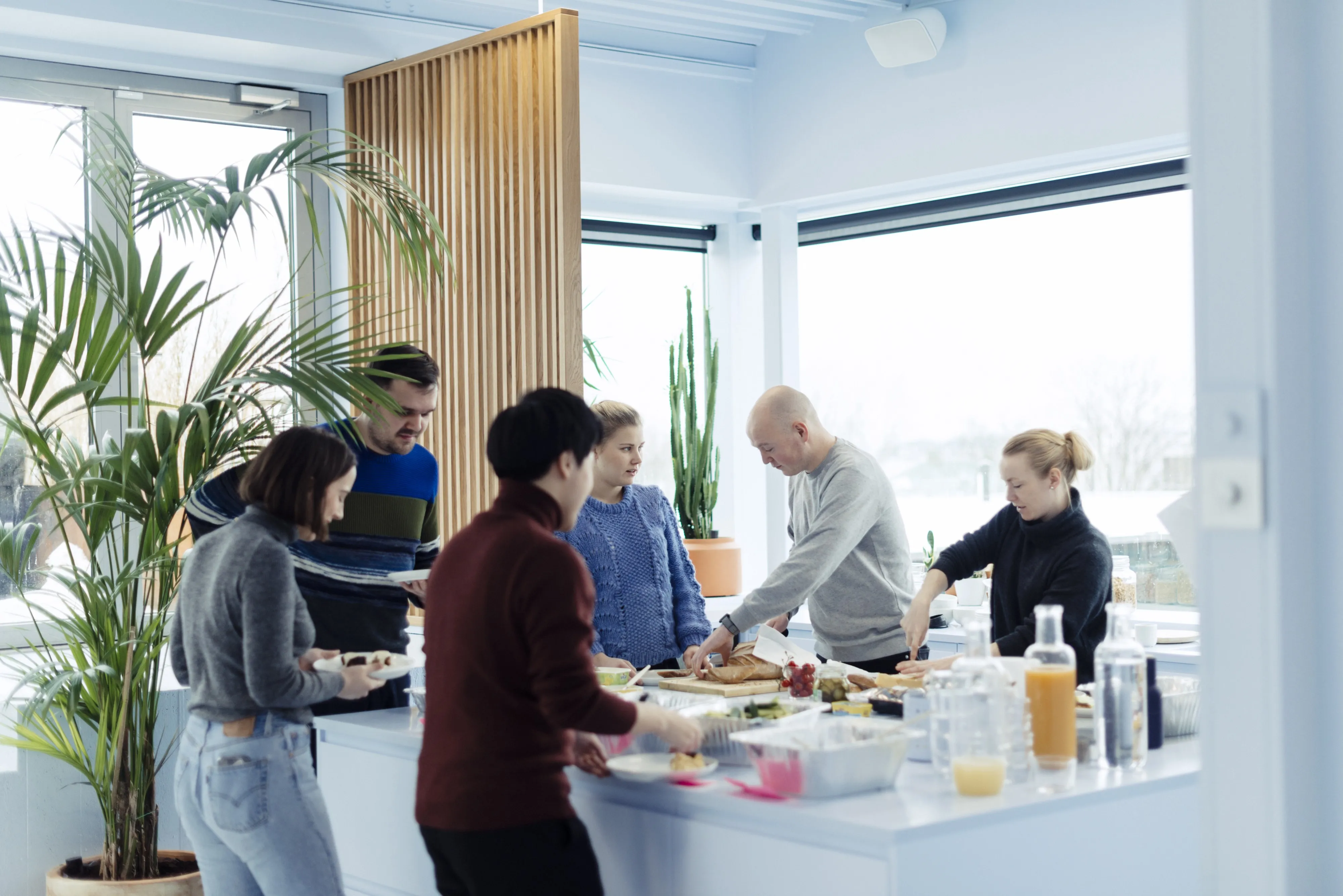
Focus on the team
Tobias feels like the company changes with every new addition. As somebody new joins B&B every 3–4 months, this leads to constant shifts in what’s important for the group as a whole. “The Mexican party was perfect for that group of five. Now we have 40 people, and we’re at a size where we’re starting to feel comfortable, it’s time to change the focus. Our growth will be about becoming a better company, not a bigger one. We’ll do fewer open events like our annual festival and more internal team activities. This year our main event will be a week-long team trip.”
“When we grew to five people, we suddenly became a group. The company was much more about them — the team became more important than our clients and even ourselves” — Tobias
The power of B&B might be that they don’t hold on to anything. As Gunvor tells me: “if you don’t force anything to be important, then you decide what’s important along the way and necessary at the time.” Their role as innovators means they’re comfortable in an ever-changing environment. Tobias is adamant that “we don’t have a 5 year strategy” and that’s exactly what makes this company so refreshing. In a world where rationale and data tend to rule over intuition and passion, B&B is an organism moving forward together in one fluid direction, determined on deep thinking and intuitive choices. And because of the feeling of trust in the group, everyone can fail once in a while. That’s what makes them one of the most intriguing innovation studios and employers out there.
Editors: Will Georgi & Yuki Kho
Photography: Anne Valeur & Lasse Fløde
.png)
%20(9).png)
.png)
.png)

.png)

